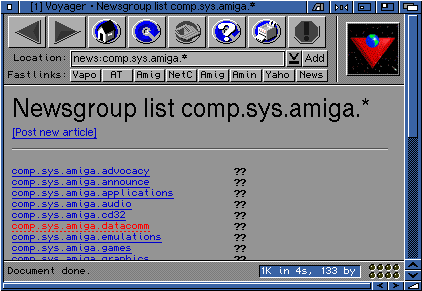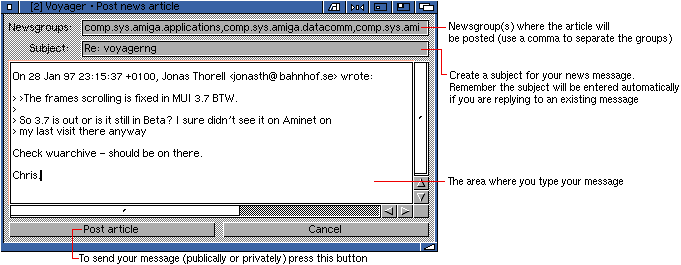Go to the previous, next, chapter, table of contents.
3.2 Using News and Newsgroups
Voyager is one of the few Amiga browsers that supports news. Although it
is not as good as using a specific thread-based news reader (such as
Microdot-II) you can download, read and even
reply to news with Voyager.
There are two ways of accessing and using news:
3.21 News: (URL Command Box)
You can automatically download the contents of a newsgroup by entering the newsgroup into the URL
command box. Let's create an example: say we wanted to look for the list of Amiga newsgroups. Goto
the URL box at the top of the page and type:

The ".*" means that it will load every newsgroup within the Amiga section. Voyager will
now load these news groups and you will be presented with a list such as below:

Let's go into one of the newsgroups to see the contents. Click on the datacomm newsgroup
and Voyager will read the and display the contents which will look something like:

You see that the messages are similar (ie. date sorted) to the kind of messages you would find
within your email program. Just click on a message, Voyager will download this and then
display it as normal.
You can reply to a news message either publically or privately. If you look at the bottom
of the news message there are two options Follow Up this Article and E-Mail Private Reply.
"Followup this Article" allows you to reply to the news message and your reply will be seen by
everyone that reads the newsgroup. If you choose to privately reply to the message, your reply will
be by email direct to the person who wrote the original message.

Remember to fill in the newsgroups section to make sure that your message goes to the correct
groups. If you fill out more than one group this is called cross posting. Be careful
here! Why? Cross posting is generally not needed - if you sent a message to the comp.sys.amiga.networking
group about some software there is no need to cross post the message to comp.sys.amiga.misc
as people will see your message in the networking group!
You also need to add a subject unless you are replying to a message. Now start to type your
message or reply into the box. When you are completed, press post to send the message
to the newsgroups.
You should see your message within the newsgroup(s) within a day or two of posting.
3.22 News Links
The first way will be through news: links when using the web. If you are searching through
a site about the Amiga they may have a "links" page. Within this page you may see some news links:
news:comp.sys.amiga.misc
news:comp.sys.amiga.networking
By clicking on these news links, the relevant newsgroup will load into Voyager and display
within the main window.
3.23 Finding a Newsgroup
All the Amiga newsgroups will be supported by your ISP. However there are more than just the
Amiga newsgroups. How do you find the newsgroup you want?
Newsgroups are divided into different hirarchies. Each hirarchy has its own name and
covers a specific area:
| Name | Content |
|---|
| alt | Alternative newsgroups covering a wide range of topics |
| biz | Business-related newsgroups |
| comp | Computer-related news. Many Amiga groups are contained here. ie. comp.sys.amiga.* |
| rec | Recreational or hobby-related newsgroups |
| misc | This contains everything else that doesn't fit into other categories |
| news | Groups containing news about Usenet itself |
| sci | Science-oriented newsgroups |
| soc | Discussions of social issues |
| talk | Groups often containing controversial issues |
Within these hirarchies are often sub-categories, separated by periods ("."). For example. if we take
a look at the main Amiga groups you will notice that they are within a "sys" (system)
sub-category linking from the "comp" main group.
3.24 Controlled Newsgroups
One of the problems with high-traffic newsgroups (groups which contain many messages) is that
the group soon becomes too large.
Because of this, news messages are often given expiry tags which mean than after a certain
number of days (or weeks) a site will delete the message. Generally the expiry dates are controlled
by the news administrator.
A low-traffic newsgroup, therefore, will contain messages that may be kept for weeks whereas
a high-traffic newsgroup may contain messages which last for a few days.
Some newsgroups are moderated which means they are monitored to make sure that only high
quality postings are excepted. The Amiga reviews newsgroup is moderated, for example, to stop
people slating a product for no particular reason.
3.25 What is Netiquette?
Netiquette is just a collection of do's and don'ts when you are connected to the
Internet. Mainly directed towards E-Mail and newsgroup users it is really a
tradition or, some would say, culture that has been developed on the Internet.
One of the problems with electronic mail is that it is difficult to express
sarcasm, humour, sadness, dissapointment so that the receiver fully understands
what you are trying to say. Indeed on occassions many receivers can view what
you have said in completely the wrong context. Say something sarcastic and the
receiver may think you are waging a personal attack!
Generally, between friends, email mis-understandings are easily recognised as you
begin to understand the other persons humour and style of writing. Newsgroups
are much different: you are sending a message to, potentially, 1000's of receivers
who will all view your message in a different way. These people will then
flame you by sending a nasty response in return. You can easily start
getting a name for yourself and (in extreme circumstances) be banned/warned off
certain newsgroups.
Some things you should try and avoid when sending an email or message to a newsgroup:
- Shouting - if you WRITE LIKE THIS you may think you are trying to emphasize
your words/comments but, on the Internet, it is classed as shouting! Avoid using
capitals within sentances.
- Signatures - you are best cutting down your signature to a maximum of 4 or
5 lines. Many "old-hat" (users connected for a few years) Internet users cannot
stand the glorification of signatures. Some people even have huge ASCII art as their
signatures that can take anything upto 15 lines. This will not be tolerated by most users.
- Flaming - if you disagree strongly (mainly on a newsgroup) or launch a personal
attack against another user you may be flamed. If you are flamed it will involved many
people writing to you (in person or in public!) to tell you that you are wrong to say
what you said and that they strongly disagree with your comments.
If you are flamed you stand the chance of being banned or warned from using a newsgroup,
IRC channel etc.
- Cultures - remember that most discussion groups contain users from all over the
world. What you think may be interesting (or even the "norm") may be totally unacceptable
to another user (from another country). Therefore, be careful before you respond to
messages.
- Threads - many newsreaders put news messages into threads which means that if
you respond to a message it connects (like a tree) to the previous message regarding the
topic. Therefore if you are following up a news message keep the content of
your message in the same topic as the subject.
- Crossposting - if you create a news message, do not (if possible) crosspost the
same message to multiple, but similar, newsgroups. If you feel that you have to crosspost,
make sure you put an apology into the message and that you don't do it too often.
- !!! or "....." - do not use lots of exclamation marks at the end of
sentances in order to tell a user you are shocked, suprised etc!!!!! Also, do not use
lots of "...." to break up sentances. Some people.....for example....use these dots
to break sentances...and words...but who knows why....?
- Bold - avoid using lots of bold or highlighted text if possible. This is particularly
true within IRC channels where some people are quite offended by the use of lots of bold
and highlighted text.
- Repeat Mail - if possible try not to repeat sending a mail to a newsgroup. True,
many newsgroups are very busy and some people may not see your message! By sending
your message 2 or 3 times, however, you will make the newsgroup even busier. You also stand
a good chance of making many people annoyed.
- Commerical Posts - if you run a company avoid posting blatent commercial
messages to a discussion newsgroup. By all means tell people you like a product (as you will
always find people who write back and tell you they disagree) but do not announce products
unless you think people will benefit from the announcement - ie. if you have released
a new patch which fixes bugs etc.
- Quoting - avoid quoting reams and reams of text if someone sends you a long email.
Just keep the basic facts or your returned mail will seem to last forever.
Most newsgroup readers work by using threads so a person reading your mail can easily
refer to the previous message if they need to.
Smileys
Smileys are intended to portray a different "mood" or emotion.
| Smiley | Meaning of the Smiley |
|---|
| :-) | Happy or being funny |
| :-( | Sad/Frowning (Quite unhappy) |
| ;-) | Winking/Sarcastic |
| :-D | Laughing |
| :-O | Shocked |
| :-/ | Fairly negative |
| :-p | Sticking tongue out |
| :-| | Straight faced - quite negative (but not that unhappy) |
Using Abbreviations
You will find the abbreviations are very common in every day Internet life (email, newsgroups,
IRC etc) mainly so phrases do not have to be written in full. Here are some common phrases:
| Abbreviation | Meaning |
|---|
| IMHO (or IMO) | In My (Humble) Opinion |
| AFAIK | As far As I Know |
| BTW | By The Way |
| FUBAR | Fed Up Beyond All Recognition |
| NRN | No Response Necessary |
| OTOH | On The Other Hand |
| ROTFL | Rolls On The Floor Laughing (action) |
| LOL | Laughs Out Loud (action) |
| RTFM | Read The Flipping Manual |
| ATM | At The Moment |
| FYI | For Your Information |
| RSN | Real Soon Now |
| WTF | What The Flip? |
| CU (or CUL8R) | See You Later |
Go to the previous, next, chapter, table of contents.
